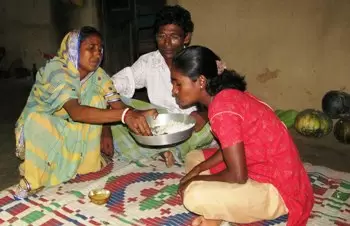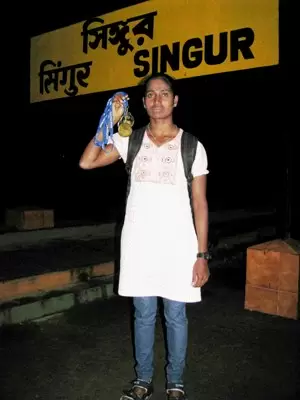A future hope for India languishes in abject poverty, determined to keep running

17-November-2011
Vol 2 | Issue 46
She doesn’t get two square meals a day, lives in a mud house and helps her father, a vegetable seller, eke out a meagre living. But despite these odds, Asha Roy is the fastest woman in India today, having clocked 11.85 seconds at the 51st National Open Athletics Championships in Kolkata.
The national record is 11.38 seconds – set by Rachita Mistry in Thiruvananthapuram in 2000.
 |
|
Mom Bulu Roy feeding her champion daughter, Asha (Photos:: Anik Dey/ WFS)
|
This 21-year-old from Ghanshyampur, a village in Singur in Hooghly district of West Bengal, also ran the fastest in the 200m, clocking 24.36 seconds, and anchored Bengal’s 4x100m relay team, which won the silver with a timing of 47.29 seconds at the Championships.
Asha, the third among four sisters, is doing the first year of her Bachelor’s degree from Sriampore College in Hooghly district. While her eldest and youngest sisters are already married, the third is a school dropout.
Only Asha has managed to continue with her studies and diligently pursue her dream of becoming one of the best athletes in the country.
“I am illiterate and I could never get a proper job because of it. I wanted my daughters to study. Asha is the only one who has sustained the effort and is now studying for her degree,” says a proud Bholanath Roy, Asha’s father.
He earns just about Rs 3,000 (US$1= Rs 50) per month by selling vegetables from door to door in his village.
Adds Bulu Roy, 45, Asha’s homemaker mother, “We live in abject poverty. When my husband falls ill, it becomes difficult for the family to make ends meet. However, we have encouraged Asha in her running and never put pressure on her to get married. We are unable to provide her with the nutrition or training she requires to become the best, but despite that Asha has thrived purely on her talent.”
Coach Prabir Chandra spotted Asha when she came first at a school meet as a student of Class III.
“I discussed her talent with her father and when I realised how needy the family was, I decided to take on the full responsibility for her training,” recalls Chandra. He reveals that Asha helps her father in selling vegetables for some time every day and then she trains, quite often on an empty stomach.
Under Chandra’s guidance, Asha has started her athletic career. In Class IV she became a member of the Bengal athletic team; in Class VI she participated in the Nationals.
In 2004 she won four gold medals and was given the honour of being the Best Athlete in the school games.
In 2009, she won the gold for 100m at the Indo-Bangla International meet and in 2010 she won the silver at the University meet. This year she has bagged the gold in the 100m and 200m races and the silver in the 400m relay in the National Open Athletics Meet.
 |
|
Asha has got little recognition from authorities for her fantastic show in the National Games
|
But to build on these achievements and to ensure a long career as a successful sportsperson, what Asha desperately needs today is something as basic as food.
“I need food, nutrition. I train from 7 am to 9 am and then from 3pm to 5 pm. I am now concentrating only on the 100m sprint and hope to qualify for the South Asian Federation (SAF) Games, to be held in New Delhi in 2012.
“But without proper nutrition or competitive training, it’s going to be extremely difficult. I seek help from everyone. I want to make my country proud,” she says.
Coach Chandra is also concerned about her future, given her extremely impoverished background. As he puts it, “She has reached this level through sheer grit and determination and because she is extremely hard-working. However, now that she has proven her worth, she certainly needs outside help.”
Both the Indian Railways and the State Government of West Bengal have made promises of a job and monetary assistance after her performance at the National Open Meet.
“Nothing concrete has materialised so far. If I get some offer, I will choose carefully so that I can train well for the SAF Games and then the Olympics,” says Asha.
But she adds that she is not going to be dependent on this, “I have struggled so far and am willing to do so in future if need be, with the support of my family and coach.” - Women's Feature Service)
















